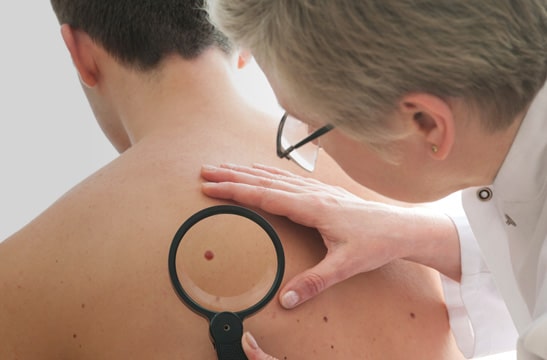Checking for Skin Cancer
Over 1.2 million new cases of skin cancer are diagnosed per year. Many skin cancers are very curable if detected and treated early. Common signs of skin cancer are moles and/or lesions found on the body, which can be flat or raised and vary in color from pink flesh tones to dark brown or black.
It is important to practice monthly head-to-toe self-examinations of your skin, so you can find any new or changing lesions that might be cancerous or precancerous. We strongly suggest that everyone over the age of 40 have a full body skin cancer screening yearly, as well as anyone who may have a family history of atypical moles and melanoma.
Here at Skin Smart, our expert providers are available for full body screenings to examine all of your moles and lesions and to answer any questions or concerns you may have about skin cancer. We also provide counseling on sun protection and offer a wide variety of sun blocks and skin care products. Remember, skin cancers found and removed are almost always curable if detected early!


Skin Cancer Prevention
The closer you are to the equator and the fairer your skin is, the more you need to protect your skin from the sun’s three ultraviolet waves – A, B, & C. While UVC isn’t a concern for skin cancer, UVA and UVB are – and each can play different roles when it comes to tanning, burning, and carcinogens. UVB tends to damage the skin’s more superficial epidermal layers, causing sunburn to the epidermis. While UVA does not cause sunburn, its longer wavelength penetrates deep into the dermis causing cellular damage, damage to your DNA, as well as wrinkles and sunspots.
It is highly recommended to use a broad spectrum SPF 30 or higher sun block daily and to wear UVA/UVB protective clothing such as hats, shirts and sunglasses while out in the sun. We strongly recommend that the sunblock you choose contain micronized zinc oxide and titanium dioxide, as these two ingredients are more effective in blocking UVA than sunscreens that contain chemical sun screening agents, such as methoxycinnamate or Avobenzone. In addition, chemical sunscreens can also cause allergic and irritant skin conditions. All sunblock should be worn 365 days a year.

